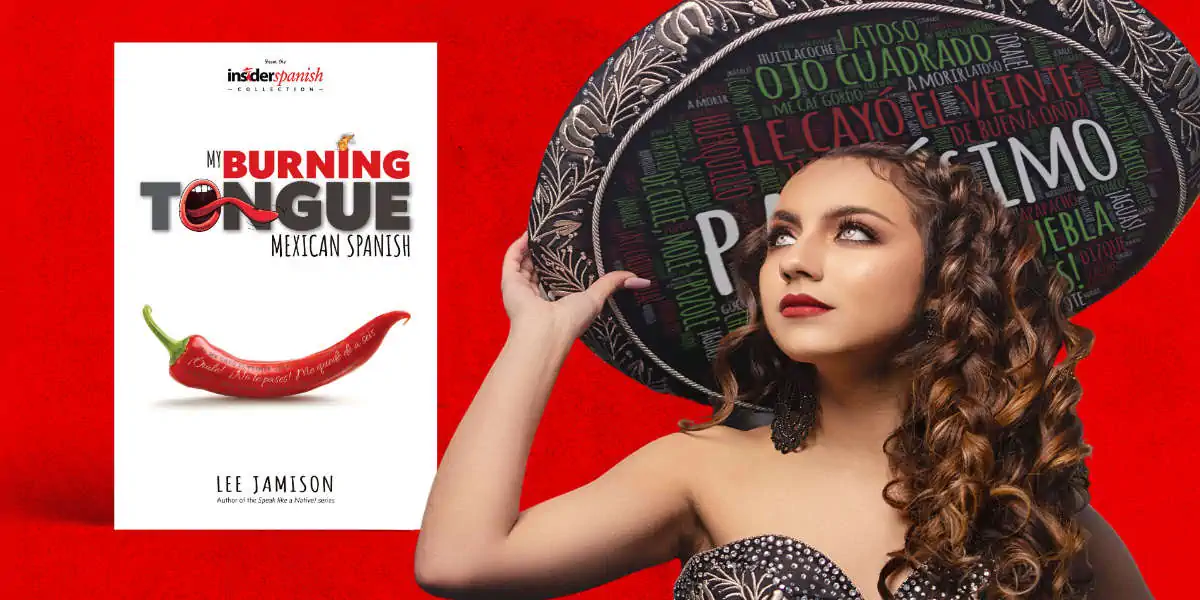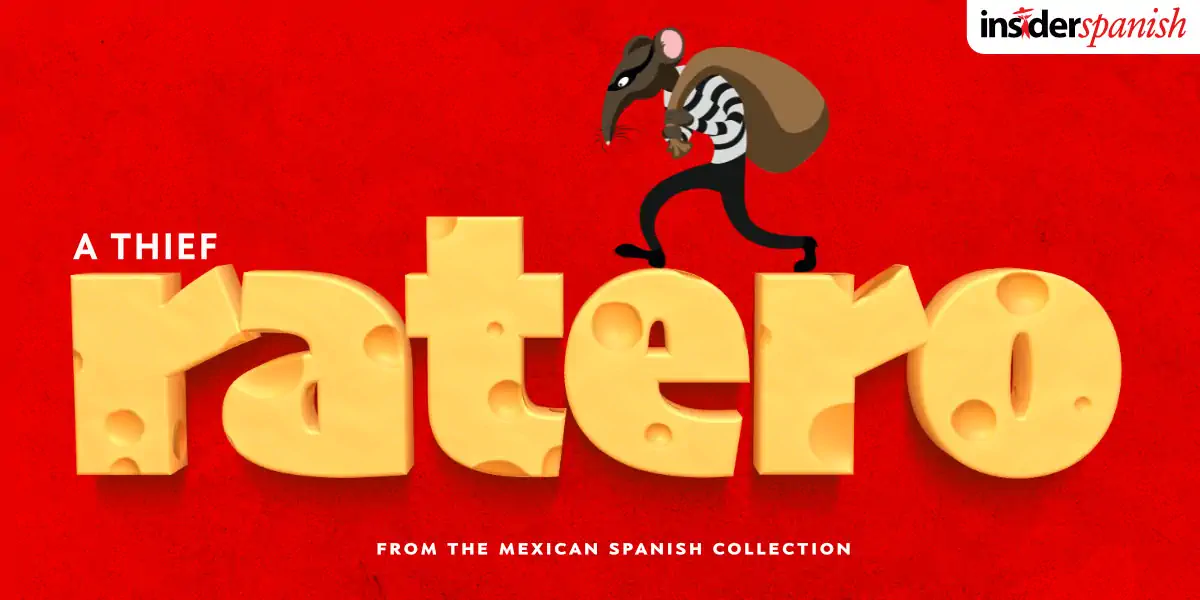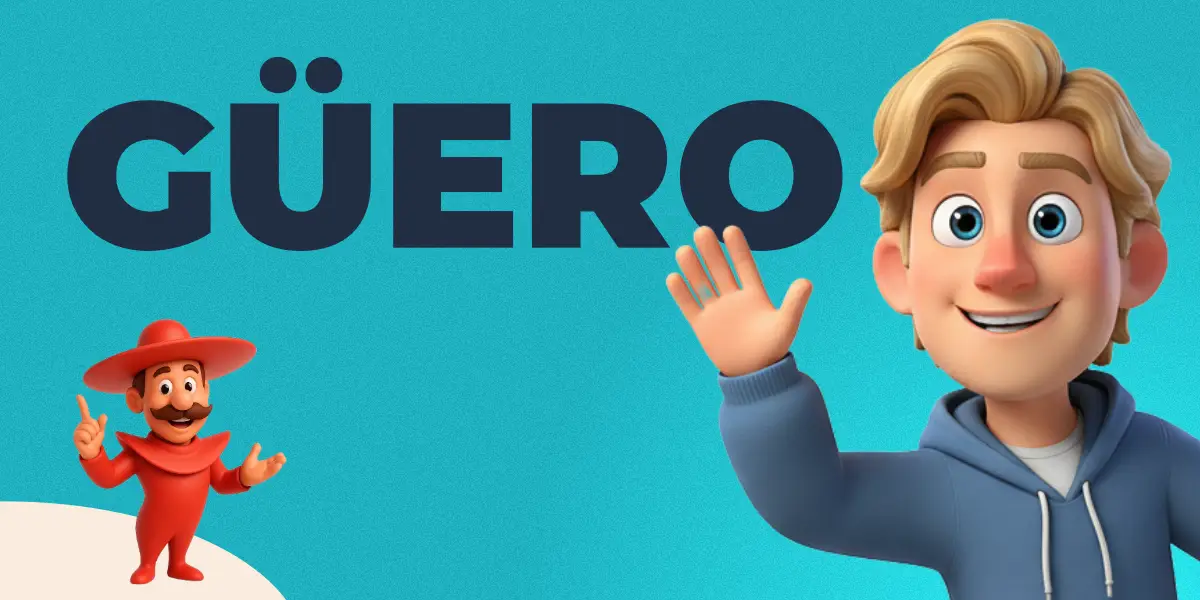20 Ways to Speak Mexican Spanish
What makes Mexican Spanish Mexican? Come along as we explore 20 examples of local words, idioms, and sayings
Rat image by Amplion on shutterstock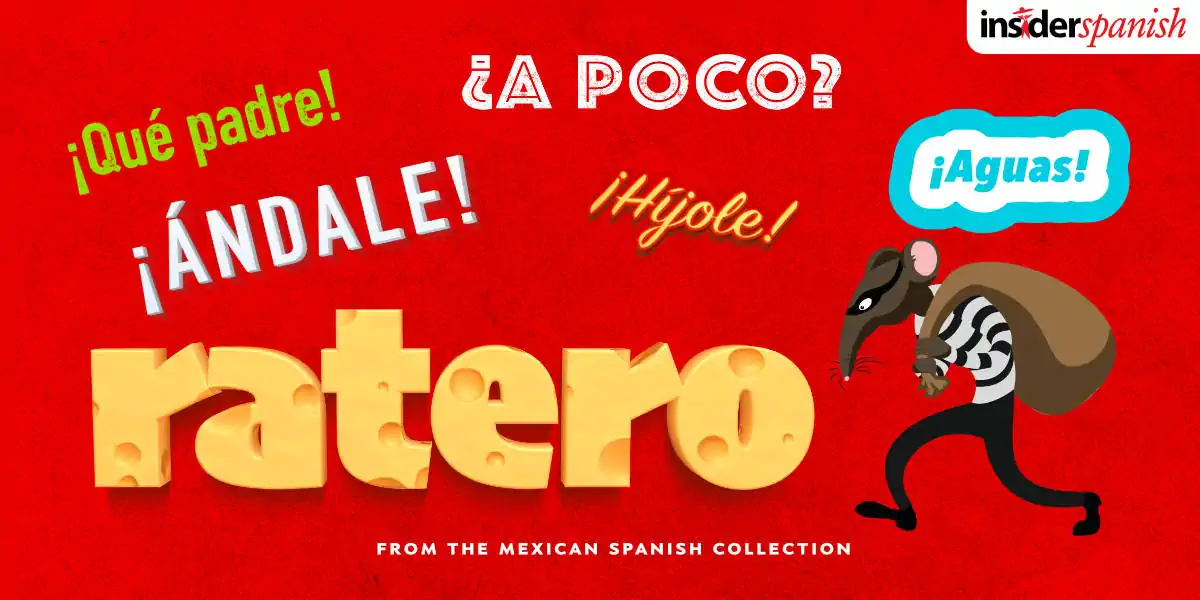
Common interjections in Mexican Spanish
1. ¡Aguas!
⚠️ Never take the humble toilet for granted. Back in the old days, you would have to do your business in a primitive container and then dump the unsavory contents out the window. As a courtesy, just before dropping the bomb, a Spanish speaker would yell out: ¡Aguas! The feared waters were coming! Today it just means: Watch out! When driving a vehicle, you might exhort your copilot:
⚽ Échame aguas.
🏈 Tell me if anything’s coming.
See also ¡Aguas! — The Many Meanings of This Splashy Mexican Spanish Expression.
2. ¡Ándale!
👍 Ready to agree to a proposal? Reply with this.
⚽ A: Nos vemos a las cuatro.
⚽ B: ¡Ándale, pues!🏈 A: We will see you at four o’clock.
🏈 B: Okie dokey.
Conversely, push others to get things done with ¡Ándale!
⚽ Vete a hacer tus tareas.¡Ándale!
🏈 Go do your homework. Get to it!
See also ¡Ándale! — The One Word That Says Everything in Mexican Spanish.
3. ¡Híjole!
😲 We hereby present you with the consummate Mexican exclamation of surprise or dismay, depending on context.
⚽ ¡Híjole! ¡Esos son los mejores tacos!
🏈 Wow! Those are the best tacos.⚽ ¡Híjole! ¡La fila está larguísima!
🏈 Yikes! The line is super long!
See also ¡Híjole! – The Swiss Army Knife of Mexican Emotion.
4. ¡Mande!
👂 Some foreigners take offense at this term. They view it as a relic of the servitude imposed during the Spanish conquest. Nevertheless, scholars who have scoured documents from the past 500 years find no support for such theories. In either case, to this day in Mexican Spanish this is the most natural and polite response when you didn’t catch what was said.
⚽ ¡Mande! No te oí.
🏈 Excuse me. I didn’t hear you.
See also ¿MANDE?: The Mexican Way of Saying “Huh?”—With Respect!.
5. ¡No te pases!
😉 AT first hearing this exclamation, I froze for a second. I thought I had overstepped my boundaries in some way. Here, however, it just means: You’re kidding.
⚽ No es cierto. ¡No te pases!
🏈 That’s not true. You’re joking!
See also ¡No te pases! — The Mexican Phrase that Calls Out Exaggeration.
6. ¡Qué padre!
IMAGINE the scene: You come from a good Catholic family and your dad just bought a new car. But before driving it around town, tradition dictated that he have it blessed by the local priest, known in Spanish as the padre. The same was expected for any valuable item, even property. Thus a connection grew between shiny, new possessions and the priest. When San Diego was awarded a Major League baseball team, what did they call it? The Padres! Few fans realize that the name of the team in plain English is the San Diego Priests. This also explains why in other parts of the country the synonym ¡Qué curada! is popular. Cura is merely another term for priest.
⚽ ¡Qué padre que regresen los autocinemas!
🏈 It’s so cool that the drive-in theaters are back!⚽ ¡Esa chamarra está padrísima!
🏈 That sweater is so beautiful !
See also The Surprising History Behind Mexico’s Coolest Expression: ¡QUÉ PADRE!.
7. ¿A poco?
Want to really sound Mexican? Then ask this question after every piece of information received.
⚽ A: ¿Escuchaste que María está encinta?
⚽ B: ¿A poco?🏈 A:Did you hear that María is pregnant?
🏈 B: No! Really?
See also What Does ¿A POCO? Mean?.
Words with special meaning in Mexican Spanish
8. chapulín
🦗 Ready to try some exotic food? Savor these tasty critters. Chapulín is the Nahuatl-derived name for the grasshopper. El chapulín colorado, or Red Grasshopper, was the popular 70’s TV show which parodied superheroes. A form of this name is found in Mexico City’s famed Chapultepec Park. Chapultepec means Grasshopper Hill in Nahuatl, the ancient language of the Aztecs. Why not hop over for a visit?
⚽ Me encantan echar chapulines en mis tacos.
🏈 I love to put grasshoppers on my tacos.
See also Chapulín: The Tiny Word That Jumps Through Mexican Culture.
9. guajolote
🦃 Meet the local word for turkey, which differs from the standard pavo.
⚽ En la finca de mi abuelo se criaban guajolotes.
🏈 On my grandpa’s farm they raised turkeys.
If, on the other hand, someone offers you a guajolota for breakfast, it has nothing to do with turkey. The guajolota is a tamale stuffed into a large bread roll. Carbohydrate overload anyone?
See also Guajolote: The Mexican Word for Turkey (and Its Surprising Cousin, the Guajolota).
10. güero
👩 They say that blondes have more fun. While that’s debatable, it’s a sure thing that your golden hair will result in Mexicans applying this adjective to you. On the other hand, when you visit the market, sellers will call you güero to butter you up and spur sales, regardless of your skin and hair color. Note that such color references are not prejudicial, but rather terms of endearment.
⚽ Roberto está noviando con la güerita de al lado.
🏈 Roberto is dating the blonde girl next door.⚽ Pásele, güerito, ¿qué le ofrecemos?
🏈 Como on in, buddy, what are you looking for?
See also What “Güero” Really Means in Mexican Spanish — More Than Just ‘Blonde’.
11. ratero
🐭 Rodents are disgusting. Ditto for thieves.
⚽ No entres en ese fraccionamiento. Son puros rateros.
🏈 Don’t go into that neighborhood. They’re a bunch of thieves.

12. titipuchal
Now what? Actually, it is Nahuatl. As is the case of many terms in Mexican Spanish, this word comes from the Aztecs’ native language—from tlallic, black thing, and putzalli, dirt or a lot of sand. Of course, they were not the first to equate sand grains with multitudes of people. In Bible times, Abraham was promised that his offspring would be like the sands of the sea. Titipuchal embraces that same notion.
⚽ A: ¿Cómo te fue en la tienda?
⚽ B: ¡No! ¡Hubieras visto el titipuchal de gente!🏈 A: How did it go at the store?
🏈 B: You should have seen it! Everyone and his mother were there!
Some common Mexican Spanish idioms
An idiom is a combination of two or more words whose meaning differs completely from the meaning of its individual components. For example, someone may say: “I am feeling under the weather.” Under the weather is an idiom, because it has nothing to do with being under anything, much less the weather. As a block it means to not feel well, to be sick. Mexican Spanish is chock full of idioms, as the following examples attest:
13. a morir
🪦 We are born, we grow up, we have children, we grow old and die. From the perspective of many, death is the ultimate end. When Mexicans do something a morir, they do so frequently or in exaggerated amounts.
⚽ Cómete todo lo que quieras. Hay tacos a morir.
🏈 Eat all you want. We have boatloads of tacos.⚽ Le echó salsa a morir en su comida.
🏈 He heaped tons of salsa on his food.
Feel free to say a morir all you wish. It won’t kill you.
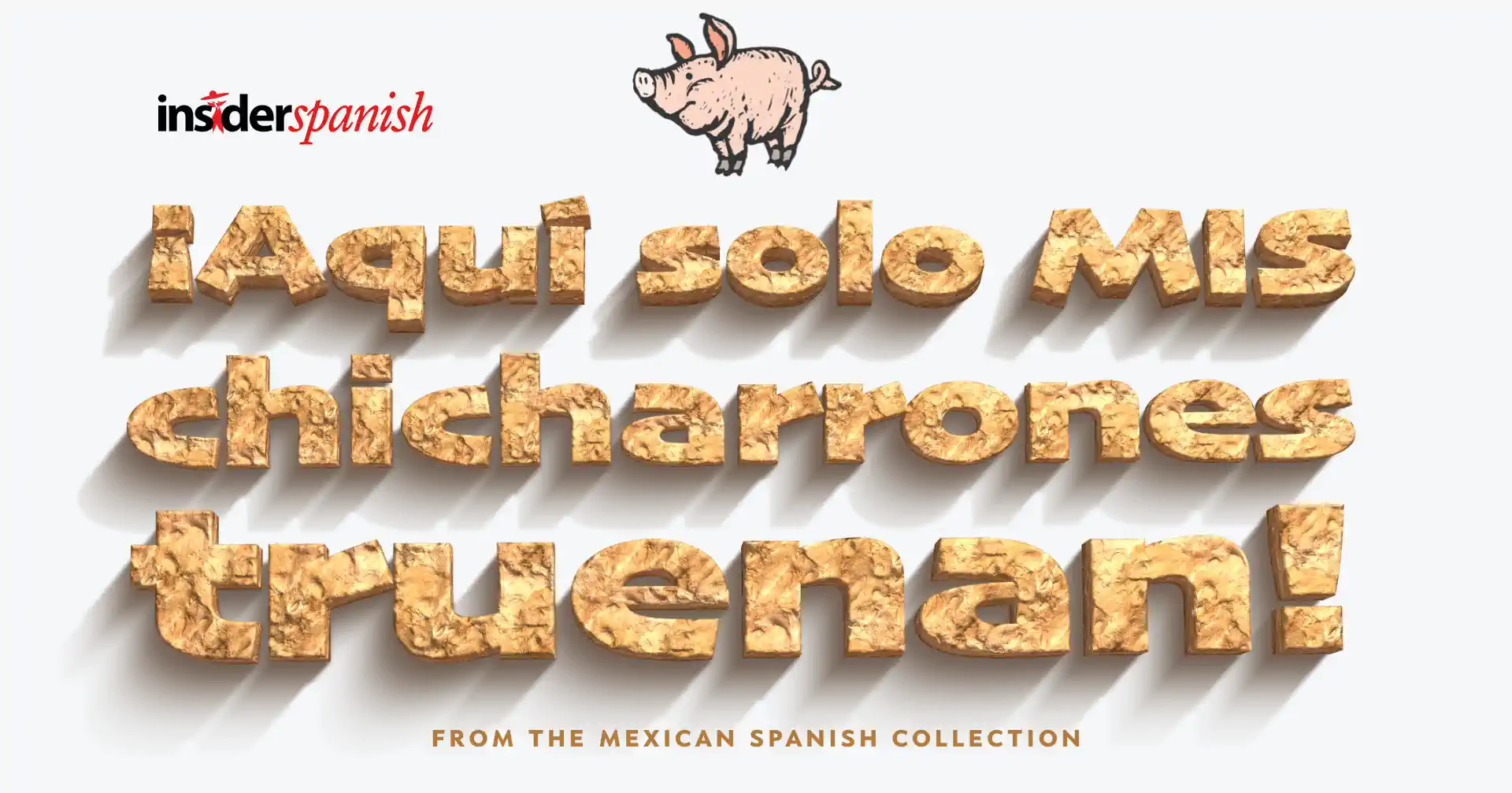
14. Aquí solo mis chicharrones truenan.
🐖 This literally means: Here only my pork rinds crack. To get an idea of the real meaning, picture yourself back in the day, ready for the family meal. On the menu is chicharrón, or pork rinds. Who gets first dibs? The father, of course. He selects the largest and crunchiest piece. When he tears it in two, according to this saying, it thunders. Nothing captures macho authority better than this. It means: I am the only one in charge here.
15. caerle el veinte
☎️ Ever make a phone call on a public telephone? Years ago in Mexico you had to put a twenty-cent coin in the machine and, when it fell, you got a dial tone.
⚽ Diez minutos después de escuchar el chiste, se echó a reír. Le cayó el veinte.
🏈 Ten minutes after hearing the joke, she started laughing. It finally dawned on her.
16. cargarle el payaso
🤡 Adrenaline rushes through your veins as you head into the rodeo to face the bull. He rushes towards you. You lunge at the last second to avoid him, but he veers towards you and gashes your leg. There you lie injured and bleeding, and the bull is heading back your way. How will you escape? Unlikely heroes descend onto the field dressed as clowns, or payasos. One or more distract the bull, while another scoops you up and carries you to safety. In Mexican Spanish, then, if the clown carries you, you are in serious trouble. From the Twitterverse:
⚽ Es necesario proteger a nuestros doctores. Si ellos caen, ¡ya nos cargó el payaso!
🏈 We need to protect our doctors If they fall, we are all fried!
17. Ponte la de Puebla.
Puebla’s professional soccer team sports a unique uniform design. A wide band cuts diagonally across each player’s body down to the waist. If it were a knife, it would slice him in half. Consequently, this has the same meaning as the previous term, Móchate. If your friend has something that you would like, do this: Spread your thumb and index finger out wide and gesture cutting a diagonal swath from your shoulder to your waist. As you do so, with sad eyes implore: Ponte la de Puebla. We hope it works, but mileage may vary.
⚽ Carnal, ponte la de Puebla.
🏈 Pal, share some of the love.
18. quedarse como el perro de las dos tortas
🐶 What a dilemma! A dog loiters just in front of a stand where tortas, hoagie-like sandwiches, are sold. Suddenly, a stroke of fortune comes his way when two tortas fall to the ground. Upon which of the two does he pounce? This one? That one? This one? Before he decides, other animals rush in for the steal; he is left with nothing. This saying is applied when indecision and perhaps a little greed leave us empty-handed.
Pedro comenzó a noviar con Ariana y Selena al mismo tiempo. ¡Pobrecito!
Quedó como el perro de las dos tortas.Pedro started dated Ariana and Selena at the same time. The poor guy
ended up with neither one!
19. quedarse con el ojo cuadrado
👁️ What effect do surprises have on you? Do you blush, cry or faint? In this geometric hyperbole, one’s eyes become square.
Cuando me duplicaron el sueldo, me quedé con el ojo cuadrado.
When they doubled my salary, I was beside myself.
A Mexican Spanish saying
Finally, we finish with a local saying that encourages us to be ever wary.
20. Hay que ponerse huarache antes de espinarse.
🌵 This saying literally suggests that you put your sandals on before you get pierced by a cactus needle. In a country filled with cactuses, the last thing you want is to puncture your foot. Solution? Just make sure you are wearing your huaraches, typical leather sandals. Need to offer a word of caution? Try this saying, which is a worthy equivalent of An ounce of prevention is better than a pound of cure.
BONUS: A Mexican Spanish Infographic
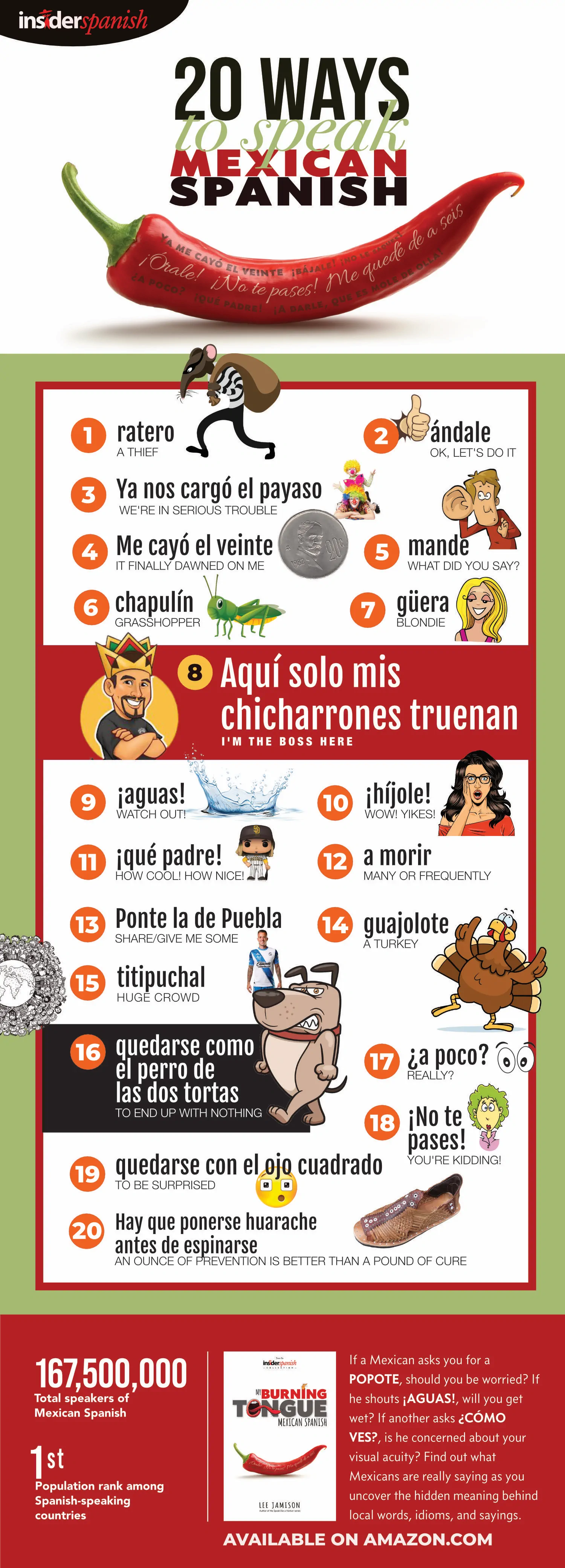
#Ad
Get the Ultimate Guide to
Mexican Spanish!
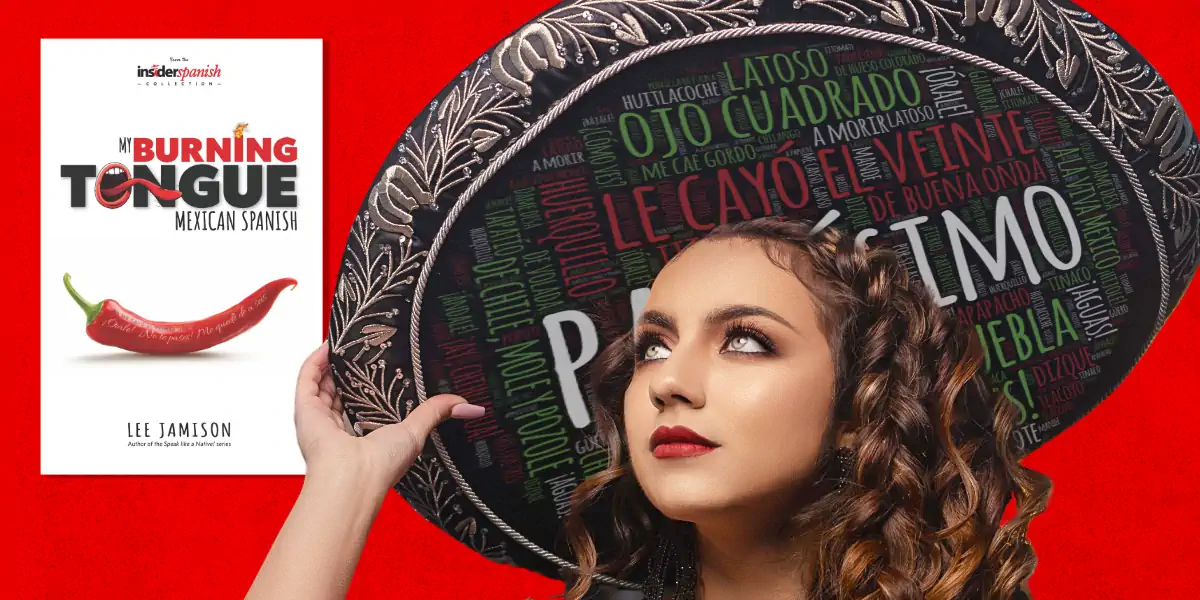
MORE than 167 million natives speak Mexican Spanish—with nearly 40 million speakers in the United States alone. Explore the idiosyncrasies of this colorful language spoken throughout the region. If a Mexican asks you for a popote, should you be worried? If he shouts ¡Aguas!, will you get wet? If another asks ¿Cómo ves?, is he concerned about your visual acuity? Find out what Mexicans are really saying as you uncover the hidden meaning behind more than 500 local words, idioms, and sayings. Some 100 illustrations make it easy to grasp the concept behind the words. We don't teach you Spanish; we teach you how to make your Spanish more Mexican! Get your copy today! Available in print and Kindle versions.

